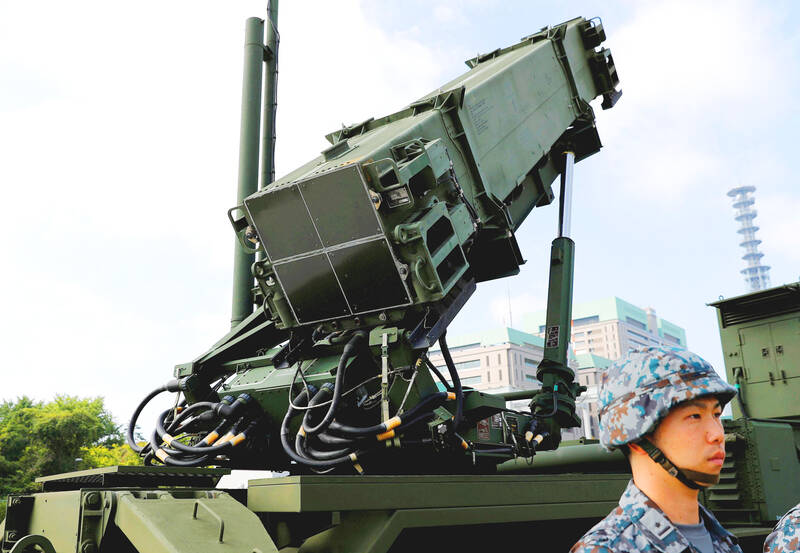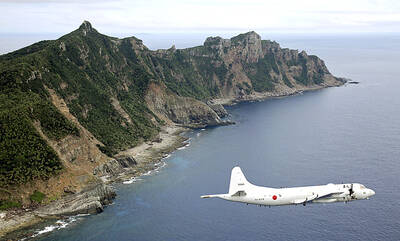The US has proposed selling Taiwan as many as 100 of its most advanced Patriot air-defense missiles along with radar and support equipment in a deal valued at US$882 million, according to a US Department of State notice obtained by Bloomberg News.
The proposal was made under the provisions of a 2010 sale and so technically is not new. It is classified as an enhancement to the earlier deal, with a potential total value of US$2.81 billion.
The upgrade would not change the overall value of that deal, which infuriated Beijing at the time and led it to halt planned military exchanges with the US.

Photo: Reuters
The department did not immediately respond to a request for comment.
Its notice to lawmakers was expected to be printed in the congressional record as soon as yesterday and be reviewed by the US Congress for up to 30 days.
In Taipei, the Ministry of Foreign Affairs said it would not comment on particular items in arms packages.
The “normalization” of arms sales to Taiwan under the administration of US President Joe Biden underscores Washington’s emphasis on Taiwan’s self-defense capabilities, the ministry said.
Taiwan is resolved to defend itself and would continue to work with the US to deepen collaboration that would continue to help shore up the nation’s defense capabilities, it said.
Air Force Command Headquarters yesterday said that the added purchases of Patriot-III missiles are part of the air force’s general arms buildup project.
The new proposal includes as many as 100 of Lockheed Martin Corp’s hit-to-kill Patriot PAC-3 Missile Segment Enhancement (MSE) missiles that are more advanced than earlier Patriots sent to Taiwan.
It also includes M903 Launcher modification kits, missile round trainers and software upgrades to accommodate the new missiles.
The proposed sale would enhance Taiwan’s Patriot missile system “to improve its missile defense capability, defend its territorial integrity and deter threats for regional stability,” the department said in the notice.
The total estimated 2010 value is to remain at US$2.81 billion, it said.
The Patriot MSE is a “small, highly agile, kinetic kill interceptor for defense against tactical ballistic missiles, cruise missiles and air-breathing threats” and “represents the next generation in hit-to-kill interceptors and provides expanded battlespace against evolving threats,” according to Lockheed Martin.
The new missile improves upon the original hit-to-kill PAC-3 “capability with a higher performance solid rocket motor, modified lethality, more responsible control surfaces and upgraded guidance software,” the department said.
The missiles are expected to be delivered in batches between 2025 and 2026, the Ministry of National Defense said.
The 100 PAC-3 MSEs would allow Taiwan’s missile batteries to have an increased range of 60km while continuing to build up the nation’s supply of PAC-family missiles, Institute for National Defense and Security Research analyst Shu Hsiao-huang (舒孝煌) said.
The new M903 Launchers would allow the military to have more flexibility in terms of missile response, Shu said.
However, Shu added that the military should still endeavor to ramp up the production of domestically produced Tien Kung-III missiles and their deployment to bolster the nation’s anti-air defense capabilities.
Democratic Progressive Party Legislator Wang Ting-yu (王定宇) said that the US engineers and consultants who would be dispatched to Taiwan as part of the deal are a sign of warming Taiwan-US relations.
Additional reporting by Lu Yi-hsuan, Aaron Tu and CNA

MISINFORMATION: The generated content tends to adopt China’s official stance, such as ‘Taiwan is currently governed by the Chinese central government,’ the NSB said Five China-developed artificial intelligence (AI) language models exhibit cybersecurity risks and content biases, an inspection conducted by the National Security Bureau (NSB) showed. The five AI tools are: DeepSeek, Doubao (豆包), Yiyan (文心一言), Tongyi (通義千問) and Yuanbao (騰訊元寶), the bureau said, advising people to remain vigilant to protect personal data privacy and corporate business secrets. The NSB said it, in accordance with the National Intelligence Services Act (國家情報工作法), has reviewed international cybersecurity reports and intelligence, and coordinated with the Ministry of Justice Investigation Bureau and the National Police Agency’s Criminal Investigation Bureau to conduct an inspection of China-made AI language

BOOST IN CONFIDENCE: The sale sends a clear message of support for Taiwan and dispels rumors that US President Donald Trump ‘sold out’ the nation, an expert said The US government on Thursday announced a possible sale to Taiwan of fighter jet parts, which was estimated to cost about US$330 million, in a move that an expert said “sends a clear message of support for Taiwan” amid fears that Washington might be wavering in its attitude toward Taipei. It was the first announcement of an arms sale to Taiwan since US President Donald Trump returned to the White House earlier this year. The proposed package includes non-standard components, spare and repair parts, consumables and accessories, as well repair and return support for the F-16, C-130 and Indigenous Defense Fighter aircraft,

CHECKING BOUNDARIES: China wants to disrupt solidarity among democracies and test their red lines, but it is instead pushing nations to become more united, an expert said The US Department of State on Friday expressed deep concern over a Chinese public security agency’s investigation into Legislator Puma Shen (沈伯洋) for “secession.” “China’s actions threaten free speech and erode norms that have underpinned the cross-strait ‘status quo’ for decades,” a US Department of State spokesperson said. The Chongqing Municipal Public Security Bureau late last month listed Shen as “wanted” and launched an investigation into alleged “secession-related” criminal activities, including his founding of the Kuma Academy, a civil defense organization that prepares people for an invasion by China. The spokesperson said that the US was “deeply concerned” about the bureau investigating Shen

DISPUTE: A Chinese official prompted a formal protest from Tokyo by saying that ‘the dirty head that sticks itself out must be cut off,’ after Takaichi’s Taiwan remarks Four armed China Coast Guard vessels yesterday morning sailed through disputed waters controlled by Japan, amid a diplomatic spat following Japanese Prime Minister Sanae Takaichi’s comments on Taiwan. The four ships sailed around the Senkaku Islands — known as the Diaoyutai Islands (釣魚台) to Taiwan, and which Taiwan and China also claim — on Saturday before entering Japanese waters yesterday and left, the Japan Coast Guard said. The China Coast Guard said in a statement that it carried out a “rights enforcement patrol” through the waters and that it was a lawful operation. As of the end of last month,